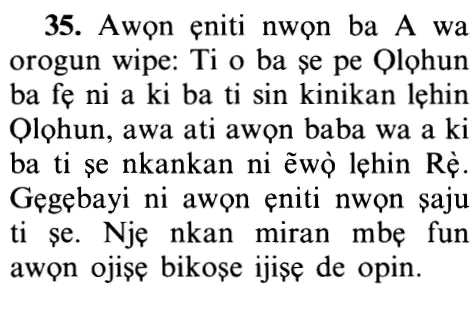16vs35
Select any filter and click on Go! to see results
وَقَالَ الَّذِينَ أَشْرَكُواْ لَوْ شَاء اللّهُ مَا عَبَدْنَا مِن دُونِهِ مِن شَيْءٍ نَّحْنُ وَلا آبَاؤُنَا وَلاَ حَرَّمْنَا مِن دُونِهِ مِن شَيْءٍ كَذَلِكَ فَعَلَ الَّذِينَ مِن قَبْلِهِمْ فَهَلْ عَلَى الرُّسُلِ إِلاَّ الْبَلاغُ الْمُبِينُ
Waqala allatheena ashrakoo law shaa Allahu ma AAabadna min doonihi min shayin nahnu wala abaona wala harramna min doonihi min shayin kathalika faAAala allatheena min qablihim fahal AAala alrrusuli illa albalaghu almubeenu
Index Terms
Click to play
Yoruba Translation

Hausa Translation
Kuma waɗanda suka yi shirki suka ce: "Dã Allah Yã so, dã bamu bautã wa kõme ba, baicinSa, mũ ko ubannimmu kuma dã ba mu haramta kõme ba, baicin abin da Ya haramta." Kamar wancan ne waɗanda suke a gabãninsu suka aikata. To, shin, akwai wani abu a kan Manzanni, fãce iyarwa bayyananniyã?
Asbabu n-Nuzuul (Occasions of Revelation)
The Idolators Argument that their Shirk was Divinely decreed, and the Refutation of this Claim
Allah tells:
وَقَالَ الَّذِينَ أَشْرَكُواْ ...
And those who worshipped others with Allah said:
Allah tells us about the idolators delusion over their Shirk, and the excuse they claimed for it based on the idea that it is ordained by divine decree.
He says:
... لَوْ شَاء اللّهُ مَا عَبَدْنَا مِن دُونِهِ مِن شَيْءٍ نَّحْنُ وَلا آبَاؤُنَا وَلاَ حَرَّمْنَا مِن دُونِهِ مِن شَيْءٍ ...
(They say:) "If Allah had so willed, neither we nor our fathers would have worshipped any but Him, nor would we have forbidden anything without (a command from) Him.''
They had superstitious customs dealing with certain animals, e.g. the Bahirah the Sa'ibah and the Wasilah and other things that they had invented and innovated by themselves, with no revealed authority. The essence of what they said was:
"If Allah hated what we did, He would have stopped by punishing us, and He would not have enabled us to do it.''
... كَذَلِكَ فَعَلَ الَّذِينَ مِن قَبْلِهِمْ ...
Those before them did the same.
Rejecting their confusing ideas, Allah says:
... فَهَلْ عَلَى الرُّسُلِ إِلاَّ الْبَلاغُ الْمُبِينُ ﴿٣٥﴾
Are the Messengers charged with anything but to clearly convey the Message!
meaning, the matter is not as you claim. It is not the case that Allah did not rebuke your behavior; rather, He did rebuke you, and in the strongest possible terms, and He emphatically forbade you from such behavior. To every nation - that is, to every generation, to every community of people - He sent a Messenger. All of the Messengers called their people to worship Allah (Alone) as well as forbidding them from worshipping anything or anybody except for Him.
يخبر تعالى عن اغترار المشركين بما هم فيه من الإشراك واعتذارهم محتجين بالقدر بقولهم " لو شاء الله ما عبدنا من دونه من شيء نحن ولا آباؤنا ولا حرمنا من دونه من شيء " أي من البحائر والسوائب والوصائل وغير ذلك مما كانوا ابتدعوه واخترعوه من تلقاء أنفسهم ما لم ينزل به سلطانا ومضمون كلامهم أنا لو كان تعالى كارها لما فعلنا لأنكره علينا بالعقوبة ولما مكننا منه قال الله تعالى رادا عليهم شبهتهم " فهل على الرسل إلا البلاغ المبين " أي ليس الأمر كما تزعمون أنه لم ينكره عليكم بل قد أنكره عليكم أشد الإنكار ونهاكم عنه آكد النهي .
"وقال الذين أشركوا" من أهل مكة "لو شاء الله ما عبدنا من دونه من شيء نحن ولا آباؤنا ولا حرمنا من دونه من شيء" من البحائر والسوائب فإشراكنا وتحريمنا بمشيئته فهو راض به "كذلك فعل الذين من قبلهم" أي كذبوا رسلهم فيما جاءوا به "فهل" فما "على الرسل إلا البلاغ المبين" إلا البلاغ البين وليس عليهم الهداية
أي شيئا , و " من " صلة . قال الزجاج : قالوه استهزاء , ولو قالوه عن اعتقاد لكانوا مؤمنين . وأخبر الله عز وجل بالغيب عما سيقولونه ; وظنوا أن هذا متمسك لهم لما لزمتهم الحجة وتيقنوا باطل ما كانوا عليه . والمعنى : لو شاء الله لأرسل إلى آبائنا رسولا فنهاهم عن الشرك وعن تحريم ما أحل لهم فينتهوا فأتبعناهم على ذلك .
I'raab - grammatical analysis of the Qur'an
«وَقالَ الَّذِينَ» الواو استئنافية وماض والذين اسم موصول فاعل والجملة مستأنفة.
«أَشْرَكُوا» ماض وفاعله والجملة صلة.
«لَوْ» حرف شرط غير جازم.
«شاءَ اللَّهُ» ماض ولفظ الجلالة فاعله والجملة لا محل لها لأنها ابتدائية.
«ما عَبَدْنا» ما نافية وماض وفاعله والجملة مقول القول.
«مِنْ دُونِهِ» متعلقان بعبدنا.
«مِنْ» زائدة.
«شَيْ ءٍ» مجرور لفظا منصوب محلا مفعول به.
«نَحْنُ» توكيد لفاعل عبدنا.
«وَلا آباؤُنا» الواو عاطفة ولا زائدة وآباؤنا معطوف على نحن ونا مضاف إليه.
«وَلا حَرَّمْنا» الواو عاطفة ولا نافية وماض وفاعله والجملة معطوفة.
«مِنْ دُونِهِ» متعلقان بفعل حرمنا.
«مِنْ» حرف جر زائد.
«شَيْ ءٍ» مجرور لفظا منصوب محلا مفعول به.
«كَذلِكَ» ذا اسم إشارة وهي مجرورة بالكاف ومتعلقان بصفة مفعول مطلق محذوف.
«فَعَلَ الَّذِينَ» ماض واسم الموصول فاعله.
«مِنْ قَبْلِهِمْ» متعلقان بصلة موصول محذوفة والهاء مضاف إليه.
«فَهَلْ» الفاء استئنافية.
«هل» حرف استفهام.
«عَلَى الرُّسُلِ» متعلقان بمحذوف خبر مقدم.
«إِلَّا» أداة حصر.
«الْبَلاغُ» مبتدأ مؤخر.
«الْمُبِينُ» صفة لبلاغ.
